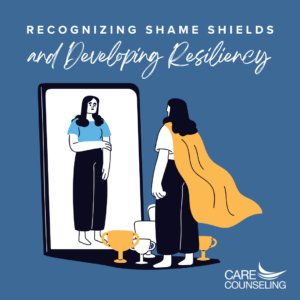Recognizing Shame Shields and Developing Resiliency
 Shame is viewed as a universal experience that is painful. Brene Brown who is well-known for her research on the topics of shame, vulnerability, and courage shares that the voice of shame tends to have two main voices that question adequacy.
Shame is viewed as a universal experience that is painful. Brene Brown who is well-known for her research on the topics of shame, vulnerability, and courage shares that the voice of shame tends to have two main voices that question adequacy.
- I am not ____ enough.
- Who do you think you are?
I think of all the things that we immediately attach to our identities and roles as who we are as individuals and as members of groups. These are things that we can proudly speak with confidence but also a question as feel unworthy or not enough such as feelings of not being worthy, deserving, good, attractive, smart, or accomplished enough. Imposter syndrome is often speaking loudly here!
All aspects of oneself, roles, and identities are impacted by shame. We often put out guard up and use invisible shields as protective armor.
Brene Brown talks about three ways that we try to disconnect from our pain of shame using shame shields.
Moving Away: This includes hiding, keeping secrets, and isolating.
Moving Towards: This includes people-pleasing and trying to win the approval of others.
Moving Against: This includes fighting with others and becoming defensive.
Developing shame resilience can offer us a healthier way to move through shame spirals. Here are the guidelines offered by Brene Brown.
- Learn how to recognize shame and understand your triggers.
Therapy can help you recognize thoughts, feelings, and behaviors that indicate shame is present. Therapy can also help identify and understand your triggers, as these may not always be fully known and can take time to discover.
- Practice critical awareness.
This involves a process of utilizing critical thinking skills to gather more information about the content in question, analyzing if these messages and beliefs are accurate or realistic, and exploring internal experiences.
- Reach out to others.
It is important to reach out and connect with other people who can be there to listen to your story and offer empathy. Reaching out can be difficult, as it takes vulnerability and courage but helps develop shame and resiliency.
- Become willing/ able to talk about shame.
Shame tends to thrive in secrecy so speaking out and having a voice is one way to help feel empowered. “Name it to tame it”. I am experiencing shame. I am struggling with ___. You get to choose what to share and the pacing at which this takes place. There are many options for support and the willingness to reach out and talk is the first step.
Written By: Charlotte Johnson, MA, LPCC



























